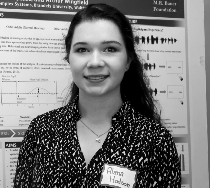Alana Hodson
 Wingfield Laboratory
Wingfield Laboratory
Department of Psychology
Brandeis University
False Understanding: Strategies in Reducing Cognitive Effort During Language Processing As We Age
Poster Abstract
Aging can come with many disadvantages, among them being a decline in cognitive performance. However, even with this decline, language processing, one of the most cognitively taxing tasks, remains remarkably well preserved. Our aim is to investigate strategies, such as “good enough” processing, that may be used by older adults to maintain their high level of performance in language comprehension despite the increase burden on cognitive resources, especially when accompanied by mild to moderate hearing loss. Pupillometry was used to measure the cognitive effort expended by participants as they listened to 160 sentences that varied in syntactic complexity and answered comprehension questions. Preliminary data revealed that while a steady increase in pupillary response occurred for all three groups in the easier end of spectrum of sentence complexity, for both older adult groups the pupil response appeared to level off in the harder conditions. In a follow-up study, we will be further investigating this tail-end response by increasing the range of difficulty of the sentences by adding plausible and implausible conditions.
Personal Statement
When I was first accepted to Brandeis, I had a clear path in mind — major in neuroscience, go on to medical school, and then become a neurologist. However, within my first few months at Brandeis, I quickly realized that there was a whole other side to neuroscience that I hadn’t considered — research. This area of academia intrigued me, and I joined the Memory and Cognition lab in the summer of my sophomore year.
I was incredibly fortunate to have joined a lab with such supportive and knowledgeable members, and I was taught more than just the basic theories in working memory and cognition. Among the most important, I learned to write code for data analysis, the ethics of working with human participants, the methods of designing an effective experiment, and how to analyze data with a critical eye. With the M. R. Bauer Fellowship, I was able to continue to expand my knowledge of neuroscience research as I designed the study that will become my senior honors research project. The poster on my work, presented at the annual SciFest event at the end of the summer, also granted me the opportunity to learn and practice another crucial skill — how to communicate my research effectively to other people. I’m grateful to the M.R. Bauer Foundation for giving me this opportunity to continue to conduct my research as I now walk down a new path, a path to graduate school and eventually heading my own lab at a university where I can impart my knowledge onto the next generation.